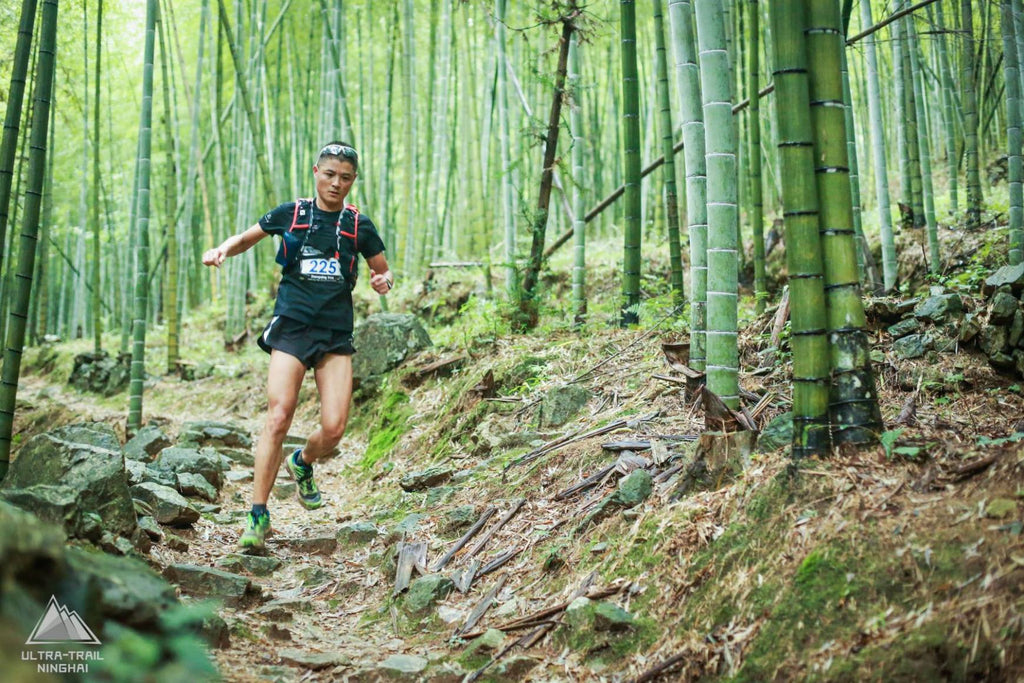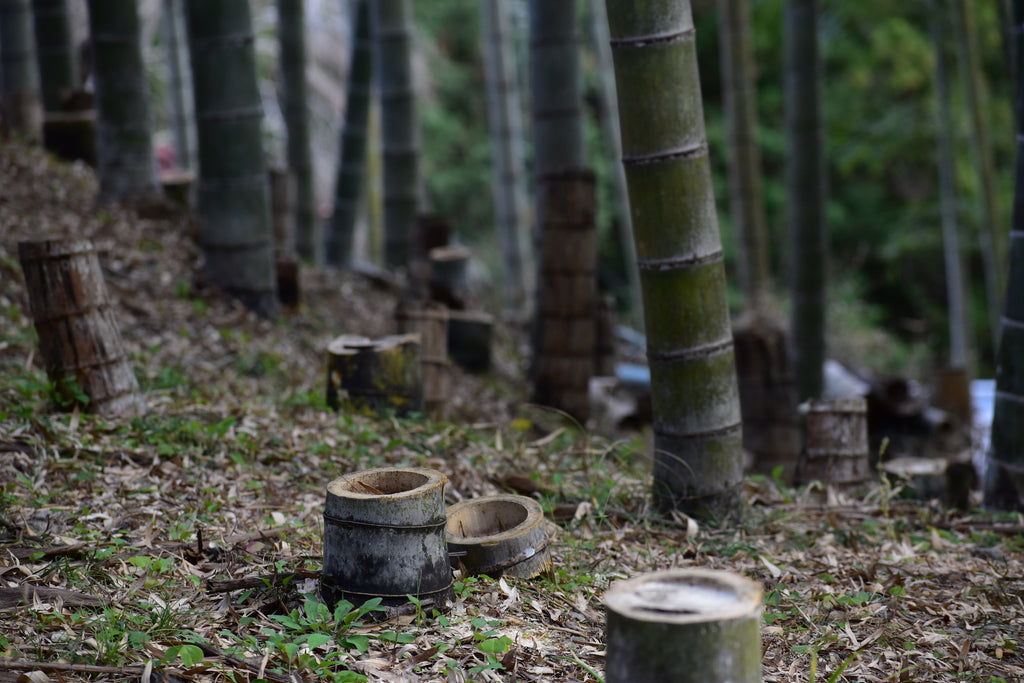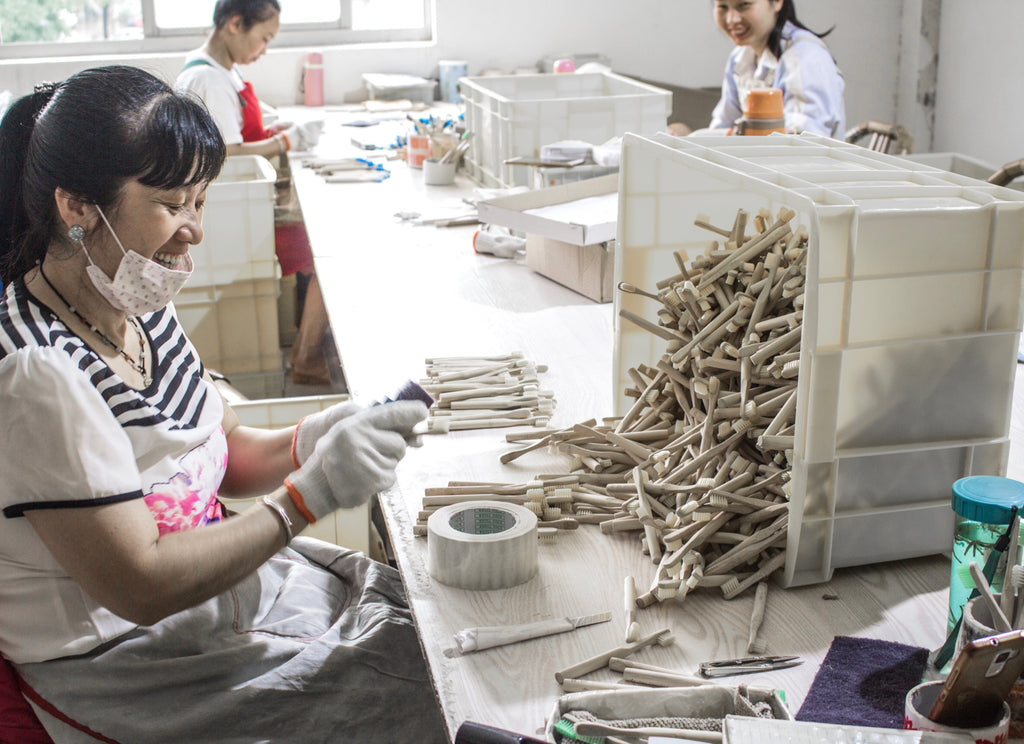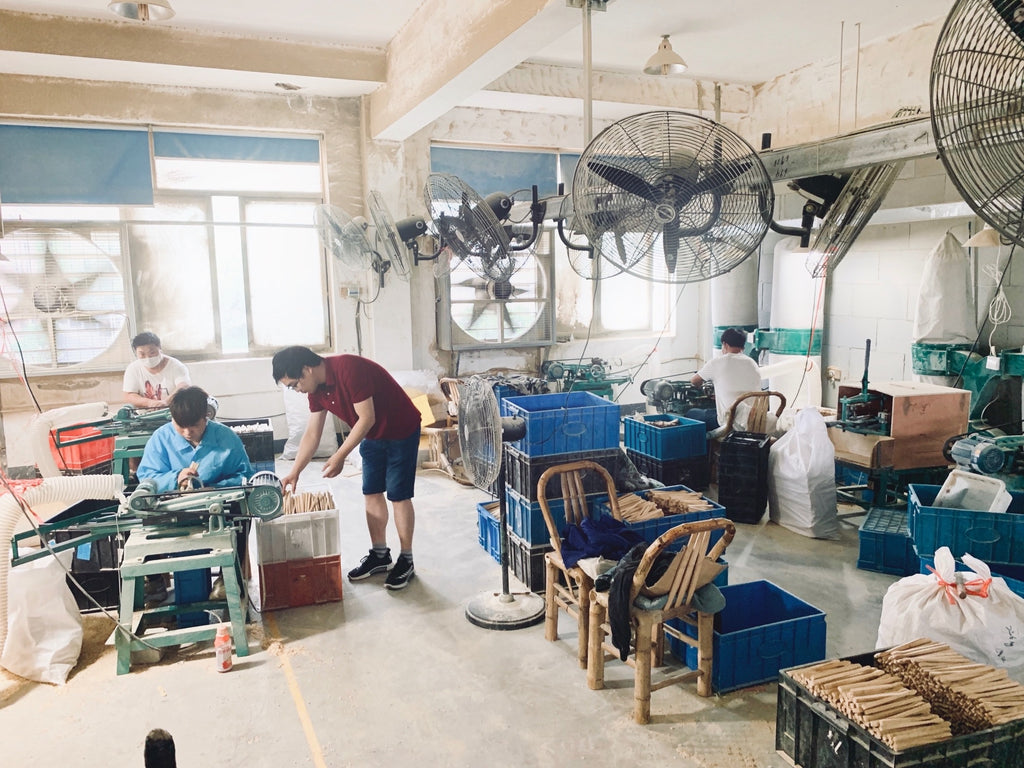Are bamboo toothbrushes really sustainable and eco-friendly? Where do you make them? Are your toothbrushes made in China? Where does the bamboo come from? Where do you ship them from? Doesn't that have a huge carbon footprint? Why don't you use local British wood?
These are all questions we have been asked more and more often in recent weeks. We want to be open and honest and answer these questions. So, here goes!
How We Make Sure Our Bamboo Toothbrushes Are The Most Sustainable In The UK
Yes, we make our bamboo toothbrushes with care in China. We aren't ashamed of this, and we don't try to hide the fact. Rather, we've made conscious decisions in order to make our toothbrushes as sustainable as possible environmentally, socially, and humanly.
We applaud customers who ask tough questions. Responsible consumers SHOULD be sceptical and ask questions to hold businesses to account for their choices - but we've also sometimes noticed a darker undertone of anti-China sentiment. Given what we know of our friends and partners in China, we feel this is very unfair!
At BAMWOO we make all our bamboo toothbrushes with care in a small family-run factory in Ninghai, China, a few hours on the bullet train away from Shanghai. We make them here because it is close to China's vast bamboo forests - the world's most sustainable source of mosu bamboo (side note: mosu is a tough and hardy species of bamboo which pandas DO NOT eat as they cannot digest it) - which means we don't have to transport the large poles far.
Despite the image some people in the West have of China, Ninghai is surrounded by beautiful nature, has some of China's first official hiking trails, and has hosted 5 Ultra-Trail World Tour running events.
1. We source our bamboo from China because that's where it grows best
We source our mosu bamboo from China because it is a native species there, and grows incredibly fast without the need for extra fertiliser or water in the warm, wet, temperate climate - in fact it accounts for 74% of bamboo forest in China (2018).
Bamboo is a grass, not a tree, which is why it is a particularly sustainable material to use: it grows very quickly (the record is 90cm in 24 hours), matures within 3 years, and regenerates - so the plant is not destroyed and continues to grow after the poles are harvested. In fact, harvesting the poles on an annual cycle actually improves the health of the mother plant and forest, as the thinning allows more light through (important for photosynthesis) and creates room for further growth.

Caption: these bamboo poles will continue to grow
Why not grow bamboo in the UK or use local wood?
1. The species of bamboo we use does not grow well in the UK's cooler climate. It is possible to grow it on warmer and sunnier slopes in Cornwall, however even there it takes over 10 years to mature - it's simply less sustainable.
2. Trees grow even slower! Cutting down trees to produce toothbrushes would completely contradict our core 1 brush = 1 tree reforestation mission, and as a tree can absorb over 20kg of carbon dioxide per year, the reduced CO2 absorption would outweigh the emissions of shipping the finished brushes (see next section!).
3. Bamboo has natural antibacterial properties, and is simply more hygienic than wood for a product like a toothbrush, which will be twice-daily submerged in water and used inside your mouth.
2. We make our toothbrushes in a small family-run factory in china to protect workers and reduce shipping emissions
We make our bamboo toothbrushes in a carefully selected facility in China, as it requires less resources to ship the finished brushes from there than it would to ship the whole bamboo poles, which can be many metres long (see section 4!).
The factory is small, clean, friendly, and family-run. Workers are paid at least double Chinese minimum wage, get several weeks of holiday per year, work normal 8 hour days with breaks - and critically for us have a fun and happy working environment!
Yes, this does mean our toothbrushes cost more than some others, but this is what we mean by social and human sustainability, which we consider just as important as environmental sustainability.
 Caption: A happy and fun work environment in our family-run factory | ©Matt Clark/BAMWOO
Caption: A happy and fun work environment in our family-run factory | ©Matt Clark/BAMWOO
I have personally visited and inspected the factory, and working conditions there are better than a number of places I have worked in myself in the UK and Europe. The notion that made in China = sweatshops, cheap labour and poor quality is simply not true!
We also take great care during production to minimise energy use and material waste. Much of the production is done by hand, and even the sawdust left over from shaping the handles is collected and re-used for cooking and heating.

3. We use the best quality BPA-free nylon-6 bristles for optimal teeth cleaning and oral hygiene
The absolute most important aspect of a toothbrush is how well it cleans teeth. It's no good making a biodegradable toothbrush if it is no good at cleaning teeth or wears out in a week - that is not sustainable.
Our key criteria for our bristles is proven cleaning effectivenesss and the best standards of oral hygiene, health standards, the durability to last at least two months of twice daily use (dentists recommend to change your toothbrush every two months), and affordability.
We made a decision to use BPA-free nylon-6 bristles for our toothbrushes, because currently there are no biodegradable options that meet the above requirements. The bristles therefore need to be removed before the brush is composted - find out how on our guide here: how to dispose of a bamboo toothbrush properly.
To give you some more detail, and the reasons for our decision:
- Plant fibres do not work well, because as they're not completely smooth they harbour too much bacteria (and don't hold up well when used with water twice a day for two months).
- Bioplastics are not actually biodegradable, just (partially!) made from bio-based materials - typically from seed oil, which often originates on land deforested for agriculture a la palm oil. Some varieties would, or could, be an option for us; however they generally have an equally sized environmental footprint to nylon-6. Few have been truly tested and there have been concerning reports about potential harmful chemical leeching... So potentially large health downsides without any real upsides.
- The one biodegradable option that would meet our tests, is pig hair from the meat industry. Our opinion is that there are too many environmental and ethical issues with that, so we have committed to not using it (you can find pig hair brushes on the market if you feel otherwise though).
- 'Charcoal infused'... Despite what some brands sneakily try to suggest, charcoal infused bristles are not actually made of charcoal or bamboo fibre, and are usually just black-coloured nylon. Which is a good thing, because charcoal is a porous material that would absorb and hold all sorts of nasties that you really wouldn't want to put back in your mouth next time you use the brush! If you like to clean your teeth with charcoal - and its absorption properties can be useful here - it's best to use it as a toothpaste that you spit out after use than on bristles you will re-use for several months.
So in short, whilst not perfect, we feel we are using the best (and industry-standard) material available at the moment for the brushes' principle job of cleaning teeth properly, but we recognise (and are always looking for) that we need to find and use something better when possible.
4. Carbon-neutral shipping, zero-plastic packaging and supporting the Royal Mail
From our factory, we then ship the finished brushes to our UK HQ in Norfolk, using an environmental-award-winning logistics company with their own carbon neutral commitment. Roughly 1000 brushes fit in a 1mx1m box - much less space, and therefore emissions, than shipping the full bamboo poles!
From our UK premises we post to customers using Royal Mail - firstly to support the beleaguered yet essential British postal service, and secondly because as RM deliver daily to most streets anyway we avoid the emissions of sending extra traffic by special courier.
All the packaging we use is recycled/able - even the padding in our envelopes is made of recycled paper fibres. No plastic bags, no plastic bubble wrap, just paper and card.
5. We plant one tree for every toothbrush we sell
Our bamboo toothbrushes are a great step and easy change to reduce plastic waste, but reforestation and our 1 brush = 1 tree mission are also one of our biggest drivers.
We plant a tree for every single toothbrush that we sell, each of which can absorb over 20kg of carbon dioxide per year for every year of their life - that's WAY more CO2 in a single year than was involved in producing and shipping our brushes, multiplied by decades or potentially even hundreds of years. To date we have planted 72,232 trees, which sequester approximately 1.5 million kilograms of CO2 per year.
 Caption: planting new trees in Nepal with our partners
Caption: planting new trees in Nepal with our partners
We plant the trees in places like Nepal, Madagascar and Indonesia, which have been particularly badly affected by deforestation, providing direct paid planting employment at the time as well as improved resources, more fertile soil and fishing grounds, and protection against natural disasters in future. This is another example of how environmental sustainability can meet social and human sustainability.
Of course producing anything at all has an environmental cost, but toothbrushes are a basic human necessity that we cannot realistically do without, and we’re confident that ours are the most environmentally friendly and sustainable available.

Hello,
Interesting process, nicely explained.
I’m interested to know more of the “ environmental-award-winning logistics company with their own carbon neutral commitment.“
Who are they? How they achieve this? And what awards have they won?
Best regards
I have to applaud your blog and answer to every awkward question that is posed to you. I am in the same business but even I want to buy off you …lol.
Your answers are so professional and your information and explanations are spot on.
Fabulous. Lynne Webster @babybambooandbeyond
Thank you for this very interesting and informative blog, I learned a lot about my toothbrushes and the variety of bamboo they are made from.